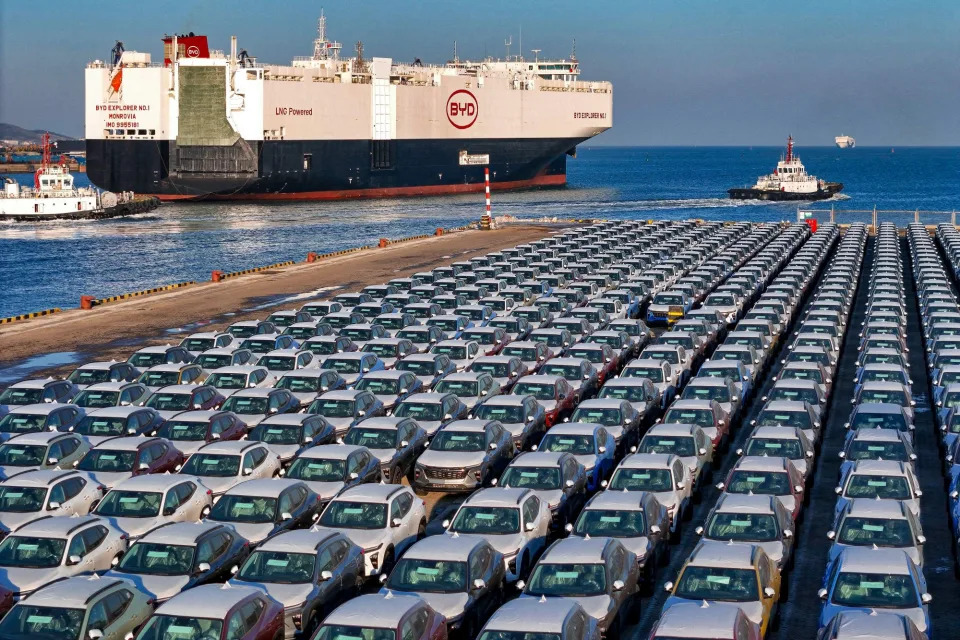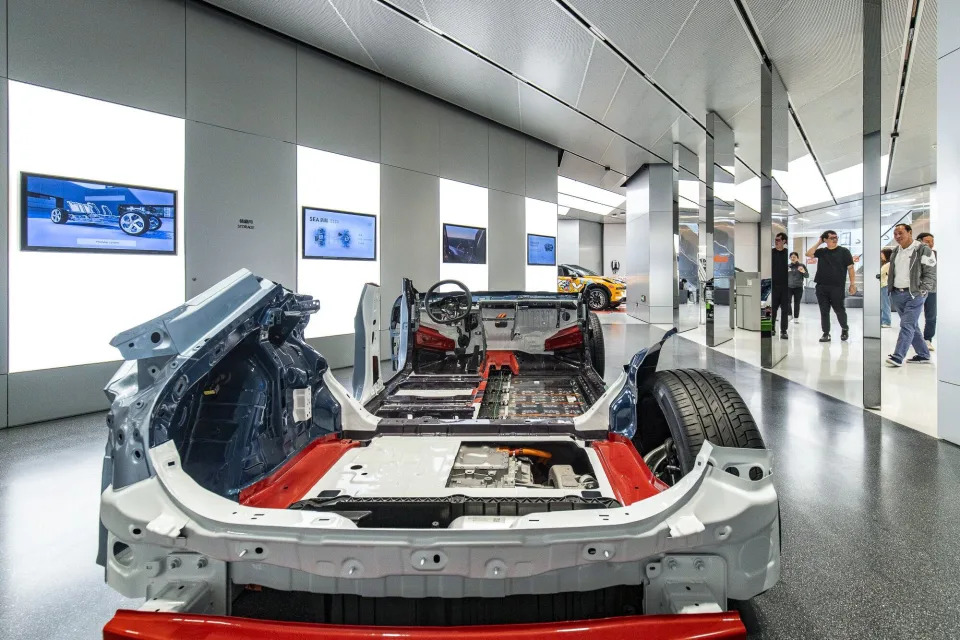South China Morning Post
Thu, Jun 13, 2024
It was just before lunchtime in Brussels, but the working day was creeping towards its end in Beijing, when phones pinged and screens flashed with the numbers that have threatened to upend China's ties with Europe.
Car companies, lawyers, business groups and journalists all received the news at once. After seven months of speculation: 17.4 on BYD, 20 on Geely, 38.1 on SAIC and 21 on nearly all others - the tariff percentages the EU would slap on electric vehicle imports from China landed with a bang.
In the Belgian capital, officials set about briefing reporters on what had been uncovered in an investigation that saw two dozen case handlers spend 250 mission days on the ground in China, conducting 100-plus company visits, piecing together thousands of pages of evidence, which cumulatively tore a new rift in an already fraught relationship.
Do you have questions about the biggest topics and trends from around the world? Get the answers with SCMP Knowledge, our new platform of curated content with explainers, FAQs, analyses and infographics brought to you by our award-winning team.
"The whole supply chain is subsidised," said a senior official, who read through the charge sheet on a case that many predict could launch a trade war.
"This means that the Chinese government provides subsidies to all operators," he continued. "Starting from the refining of lithium used in the batteries, to production of cells and batteries, to the production of BEVs [battery electric vehicles], and even transport of BEVs to EU markets."
Chinese business representatives were shocked. After a quick scan of the numbers, an executive at one affected EV company vowed to start shipping hybrid cars to Europe instead, since they would not be subjected to such high duties.
"The EU has disregarded facts and WTO rules, ignored China's repeated strong opposition, and ignored the appeals and dissuasions of many EU member governments and industries, and has acted unilaterally," fumed a statement from China's Ministry of Commerce, which landed minutes after the notification had been received.
Since day one, the EV probe - as it has become known across Europe, where it has dominated the debate on China - was steeped in controversy.
"Global markets are now flooded with cheaper Chinese electric cars. And their price is kept artificially low by huge state subsidies. This is distorting our market," said European Commission President Ursula von der Leyen during her annual State of the Union address last September.
Her announcement took many of her officials off guard. It was also news to the Chinese government, whose diplomats were instantly aggrieved at not being consulted before the public announcement, as is commonplace in the relationship.

Electric cars waiting to be loaded on to the BYD Explorer No 1 at Yantai port, in eastern China's Shandong province. Photo: AFP alt=Electric cars waiting to be loaded on to the BYD Explorer No 1 at Yantai port, in eastern China's Shandong province. Photo: AFP>
The work kicked off immediately: out of 21 Chinese groups exporting EVs to Europe, they shrunk the sample size to be investigated to three.
These were BYD, the hotshot upstart that would soon become the world's biggest EV seller, Geely, which spent the 2000s hoovering up blue-chip European brands like Volvo, and SAIC Motor, the 70-year-old state-run giant, owner of the iconic MG and joint venture partner to Volkswagen.
The eventual duty applied to most Chinese EV exports to Europe would be a weighted average calculated based on subsidies found on the books of those three companies. When experts noted the presence of behemoth SAIC on the list, they predicted countervailing duties could far outstrip the bloc's average rate of 19 per cent.
Questionnaires were sent to the companies, each running to 60-odd pages and over 18,000 words. They demanded access to financial information and forensic levels of details on the handouts each had received from the Chinese state.
"It is in your own interest to reply as accurately and completely as possible and to attach supporting documents. You may supplement your response with additional data," read the dry legalese that translated into a veiled warning that would become reality: comply with this, or you will be tariffed out of the European market.
As it was, only SAIC chose not to comply and found itself on Wednesday facing the highest import duty for all EU EV shipments, and the third highest countervailing duty the bloc has ever levied, Rhodium Group research showed. This will be applied on top of the pre-existing 10 per cent rate, meaning the cars will be almost 50 per cent more expensive.
The others - including BYD and Geely - played ball and will therefore be taxed at a lower rate than standard EU-owned models, which will face the weighted average of 21 per cent.
"SAIC is highly reliant on the European market and doesn't have plans yet to localise production, so it's going to be very affected by this," said Ilaria Mazzocco, an expert on China's EV trade at the Centre for Strategic and International Studies.
"BYD looks like it's going to be in a great position with an EU factory, low tariff, and a geographically diversified market."
The Chinese government was also sent a batch of questionnaires, which it declined to forward to selected lithium providers and local banks on the EU's behalf.
"The Chinese government has been very active, looking for justification of different steps," said the senior EU official. "There has been a lot of interaction, but less positive activity on their side when they were supposed to provide us with information requested."
Instead, Beijing tried to kill the investigation with a series of threats that multiplied as Brussels' probe raced towards its conclusion.
In January, it launched an anti-dumping process into EU brandy shipments, broadly seen as comeuppance for France, which was - along with Spain - among the strongest backers of the EV action. France shipped US$1.8 billion in cognac to China last year, customs records show.
In the past month, state media have carried threats of tariffs on EU pork, automotive, aviation, and dairy sectors.
"China will closely follow the EU's subsequent progress and will resolutely take all necessary measures to firmly defend the legitimate rights and interests of Chinese companies," the commerce ministry statement said.
Brussels is confident that it has a watertight case for the tariffs, and would welcome a WTO challenge, where it would point to the fact that some Chinese companies will pay lower duties than European rivals.
Their investigators turned up subsidies everywhere they looked. Lithium processers and battery makers were told by the state to sell to EV companies below market rates, they said, while the car companies were exempt from battery consumption taxes.
The firms issued green bonds that government-run financial institutions were ordered to buy, and were granted concessional land, income tax breaks and cheap refinancing options mandated by the People's Bank of China, the central bank.

An intersection of a Geely Zeekr electric vehicle, the high-end electric car brand under Zhejiang Geely Holding Group. Photo: Bloomberg alt=An intersection of a Geely Zeekr electric vehicle, the high-end electric car brand under Zhejiang Geely Holding Group. Photo: Bloomberg>
The EU believes its companies suffered as a result. Between January 2020 and September 2023, Chinese companies increased their EU market share from 4 per cent to 25 per cent, while local rivals' share dropped from 69 per cent to almost 60 per cent, officials said.
Chinese subsidies "jeopardised" Europe's green transition, they added, by suppressing the price at which European companies could sell EVs, meaning in some cases, they were incurring losses on each vehicle sold.
To environmentalists, who hold little truck with German car companies slow to wean themselves off combustion engines, it will sound like sour grapes.
"We want no tariffs that would not help us achieve our decarbonisation targets," Malta's energy minister, Miriam Dalli, told the Post last month. "Having products that are more pricey will not help us arrive at the ambitious targets."
But in Brussels, getting the probe over the line was seen as a test of its credibility, with officials saying they had to show China they not only bark, but bite too.
The three Chinese car companies now have four days to point out any flaws in the calculations, after which time member states have until July 15 to voice their own concerns.
The saga has pitted capitals against each other, with Paris cheering von der Leyen on, even as Berlin worked behind the scenes to kill it. At meetings, one senior official said, the Germans had even used the term "so-called overcapacity", in a sign of how aligned they were with Beijing.
Duties that will hold for five years must be set in early November, with some speculating that the next four months will be a mixture of retaliatory measures and frantic diplomacy.
"The focus now must be on keeping negative effects on international supply chains and European companies as low as possible," said Wolfgang Niedermark, a board member at the Federation of German Industries.
"European companies have no interest in a trade conflict with China escalating."
Copyright (c) 2024. South China Morning Post Publishers Ltd. All rights reserved.
No comments:
Post a Comment